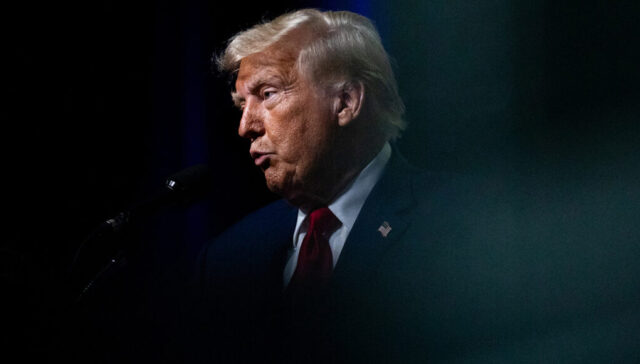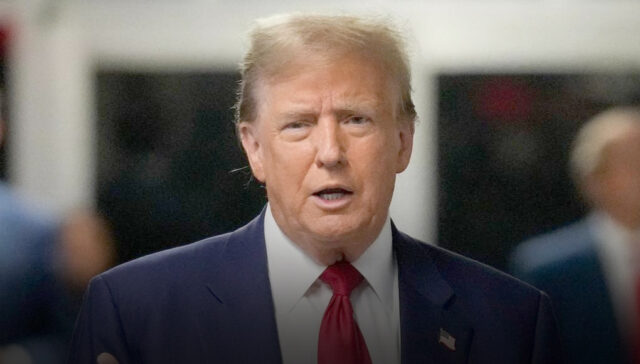As 5 November fast approaches, anti-Trump rhetoric is reaching nauseating levels.
Democrats and the media – but I repeat myself – have made the central focus of their 2024 campaign about how Donald Trump is “the greatest threat to democracy” in history. They claim the 45th President is a tyrannical dictator-in-waiting, but forget one thing: he was the 45th President.
During Trump’s presidency, he had ample opportunity to become the totalitarian dictator the left so badly wants him to be, yet his record was exactly the opposite.
TRUMP THE PEACEMAKER
While Trump often claims he is the only President in the last 72 years not to be involved in war, this is not exactly true. However, he did not meaningfully engage in military conflict during his term.
The last decade has been filled with lie after lie about Trump, to the point where even the most ardent Trump supporter probably believes at least one of them.
Technically, the power for the US to declare war rests solely with Congress. A worrying modern departure from this constitutional requirement has been general resolutions from Congress authorising the continuing use of military force. This is how “conflicts” such as the Korean, Vietnam, Gulf, Iraq and Afghanistan wars occurred without proper, constitutionally required, authorisation – even though they were full-scale wars and are always referred to as wars.
Other presidents have also been heavily involved in the escalation of foreign conflicts, the current Administration’s heavy financing of Ukraine being one such example. Trump, on the other hand, used the military sparingly but effectively and demanded other countries pay for US protection – creating a financial disincentive for war. Trump’s only real use of the military was quickly cleaning up the ISIS conflict he inherited.
While Trump may have been involved in military engagements, he certainly tops the list as the most peaceful US President since World War II.
TRUMP THE DEMOCRAT
A common theme among dictators is the centralisation and concentration of power. Trump has been an advocate of states’ rights, pledging “to make states the laboratories of democracy once again” during his 2017 inauguration speech. During his Administration’s Covid response, he largely allowed the states to handle their own policies. During a time when most political leaders looked to seize power, he sought to relinquish it.
But where Trump advanced states’ rights most was in his many judicial appointments: appointing judges and justices who recognised the policy-making power that resided in the hands of the states. One consequence of this was in 2022 when the Supreme Court overturned the faulty premise that prevented states from regulating abortion.
Contrary to popular belief, Roe v Wade had little to do with abortion and everything to do with states’ rights. No matter your view on abortion, if the Constitution says it is subject to state regulation, that’s what the Supreme Court should confirm.
When it comes to executive orders, Trump averaged 55 per year, far more than the one or less per year of the first six presidents but a lot less than the 307 per year that Franklin D. Roosevelt – who is an often-highly regarded President – averaged. Even the much-beloved John F. Kennedy averaged 75 executive orders per year. Neither of those men are referred to as dictators.
In fact, Trump’s use of executive orders sits almost exactly on the average of all presidents combined, which includes the early presidents who signed almost none. That’s nowhere near the level you would expect of someone with dictatorial tendencies.
2020 HINDSIGHT
But what about the 2020 Election? That is where Trump showed his true colours, according to his haters. And while Trump certainly is not the most gracious loser, he was completely within his rights to question and contest the legitimacy of the results: it is the right of all political participants. Hilary Clinton did it in 2016 and Al Gore did it in 2000 – both Democrats.
The difference between Hilary Clinton’s denial of the 2016 results and Donald Trump’s denial of the 2020 results is that Trump was right: the 2020 election was rigged.
The traditional media, social media and the FBI teamed up to ensure the Hunter Biden laptop story never saw the light of day before the election. Had that story been given its proper coverage, or even just not suppressed – people were literally prevented from posting about it on Twitter and other social media platforms – we would have likely seen a different result. If that isn’t rigging an election, someone tell me what is. Let’s not even get into the fact that several states used widespread mail-in ballot voting without the proper legislative approval to do so.
FELONY OUTRAGE
But Donald Trump is a convicted felon! How could anyone support that, the indoctrinated say, while simultaneously claiming that Trump is out to imprison his political opponents without a shred of irony.
Trump was not convicted of paying “hush money” to a pornstar, there is no crime in a non-disclosure agreement. Trump was convicted of 34 counts of incorrectly filling out business documents, a misdemeanour offence in New York meriting a similar punishment to a speeding fine or other trivial traffic offence.
The New York District Attorney (NYDA) managed to convince 12 New York progressives that it was a felony by nebulously claiming that Trump incorrectly completed the business forms in order to commit another crime; it was not necessary for the NYDA to actually indicate what that other crime was, nor for the jurors agree on that other crime. Not to mention, the NYDA relied solely on the evidence of Michael Cohen, a disgruntled former Trump employee with an axe to grind.
A worrying modern departure from this constitutional requirement has been general resolutions from Congress authorising the continuing use of military force.
Had it been any other person, the NYDA would have settled for a misdemeanour offence, if they had even bothered to prosecute it at all.
FACISMO AMERICANO
Finally, the pièce de resistance of the anti-Trump rhetoric: he is a Nazi. The kind of opposition that, if repeated often enough, might just lead someone to be justified in taking a shot at him. I mean, we’d all kill Hitler, right?
I don’t have enough words to debunk every single instance where Democrats, or their media allies, have called Trump a Nazi, so I will focus on the most recent: Trump held a rally at Madison Square Garden. So what is the connection? Well, in 1939, a group of American Nazis also held a rally there and, well, that’s it. What’s more, Madison Square Garden actually moved location in 1968, so Trump’s rally was not even at the same location as the 1939 Nazi rally.
Even before the rally had begun, mainstream media pundits were flapping their jowls with disgust, drawing comparisons between the 1939 rally. I wonder if these same propagandists are as concerned that Andrea Bocelli is scheduled to hold Nazi concerts there in just over a month. And these propagandists must be shocked to learn that the New York Knicks plan to host 38 Nazi games there over the upcoming NBA season; maybe they should rename them the Nazi Knicks.
VOTE TRUMP
The last decade has been filled with lie after lie about Trump, to the point where even the most ardent Trump supporter probably believes at least one of them. Looking back on pre-politics Trump, who was often portrayed in a positive light, seems like another time completely. And there will be a time when propagandists will point to Trump as being “not so bad after all”, like they do with George W. Bush now – even though they said similar things about him during his presidency.
Given the Libertarian Party has failed to nominate a libertarian candidate and Robert F. Kennedy Jr has dropped out of the race (although he will still appear on the ballot in many states, including the key states of Michigan and Wisconsin), I urge all American readers to vote Trump this Tuesday. Don’t stay home: vote.











